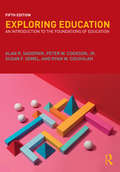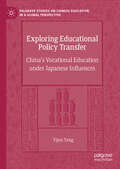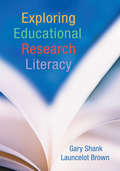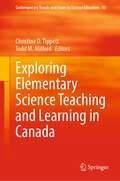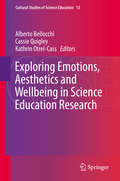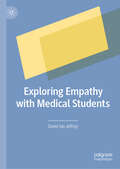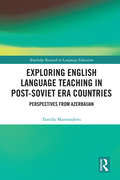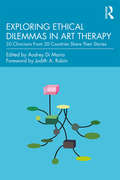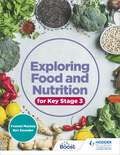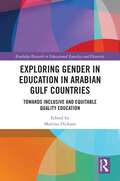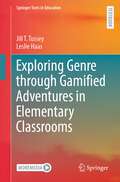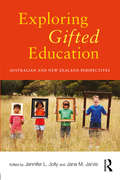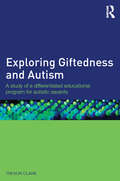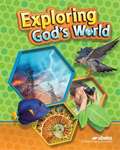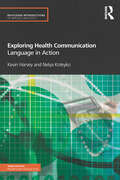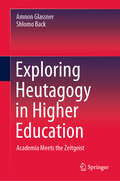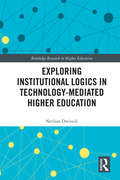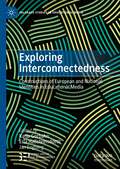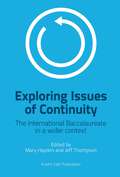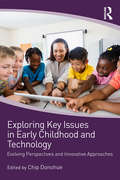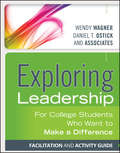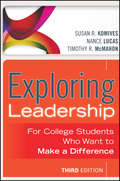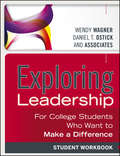- Table View
- List View
Exploring Education: An Introduction to the Foundations of Education
by Alan R. Sadovnik Susan F. Semel Ryan W. Coughlan Peter W. Cookson, Jr.This much-anticipated fifth edition of Exploring Education offers an alternative to traditional foundations texts by combining a point-of-view analysis with primary source readings. Pre- and in-service teachers will find a solid introduction to the foundations disciplines -- history, philosophy, politics, and sociology of education -- and their application to educational issues, including school organization and teaching, curriculum and pedagogic practices, education and inequality, and school reform and improvement. This edition features substantive updates, including additions to the discussion of neo-liberal educational policy, recent debates about teacher diversity, updated data and research, and new selections of historical and contemporary readings. At a time when foundations of education are marginalized in many teacher education programs and teacher education reform pushes scripted approaches to curriculum and instruction, Exploring Education helps teachers to think critically about the "what" and "why" behind the most pressing issues in contemporary education.
Exploring Educational Policy Transfer: China’s Vocational Education under Japanese Influences (Palgrave Studies on Chinese Education in a Global Perspective)
by Yijun YangThis book examines the detailed process of China’s borrowing from the Japanese vocational education model from the perspective of educational policy transfer. It is expected that a systematic examination of the history of China’s borrowing of Japanese vocational education through the lens of educational policy transfer will, on the one hand, fill the gap in the study of the history of vocational education in China from the perspective of educational policy transfer, and on the other hand, allow the applicability of the educational transfer theoretical framework to be tested through the example of China’s borrowing from Japanese vocational education.
Exploring Educational Research Literacy
by Launcelot Brown Gary ShankExploring Educational Research Literacy offers beginning classroom teachers a comprehensive introduction to the topic of educational research literacy—that is, the ability to read educational research articles in a systemic and critical way. Many beginning teacher education students are expected to be familiar with the latest research in their field, but are not necessarily researchers themselves. In fact, many new students have had little exposure to educational research. In this accessible text, Gary Shank and Launcelot Brown give students step-by-step guidance through the often baffling process of learning a new 'language' of research methods. Using clear and friendly language, and employing simple articles created to introduce students to important ideas in an engaging manner, Exploring Educational Research Literacy gives students the tools to shift from being passive consumers of research to active and critical readers capable of evaluating research and judging the usefulness of the findings for educational practice. Features include: CD-ROM including ten real research articles and eight "training" articles: Each lets students practice their research literacy skills and includes a list of questions to guide students in their reading" 'Practice Makes Perfect': end of the chapter reflection activities that prompt students to apply research skills described in each chapter Article Literacy Checklist: a guide to help students read research articles critically Glossary of key terms Clear and engaging style: Exploring Educational Research Literacy is written so that even students who are new to educational research can gain a clear understanding of and ability to apply the special skills needed to read research articles
Exploring Elementary Science Teaching and Learning in Canada (Contemporary Trends and Issues in Science Education #53)
by Christine D. Tippett Todd M. MilfordThis edited volume showcases current science education research in Canada, from pre-Kindergarten to Grade 7, conducted in Canada by a diverse group of researchers from across the country. We draw on the themes that emerged from our previous book, Science Education in Canada: Consistencies, Commonalities, and Distinctions, to guide the structure of this book on elementary science education research. In particular, chapters on science teacher preparation; Indigenous perspectives; environmental education; science, technology, engineering, and mathematics (STEM); and science, technology, society, and the environment (STSE) reflect a Canadian perspective. However, these themes are of global interest and authors include ideas for how science education research in Canada might be used by academics and researchers in other countries. This book builds a cohesive picture of current elementary science education research in Canada, highlighting themes that will resonate with international readers.
Exploring Emotions, Aesthetics and Wellbeing in Science Education Research
by Kathrin Otrel-Cass Alberto Bellocchi Cassie QuigleyThis book addresses new research directions focusing on the emotional and aesthetic nature of teaching and learning science informing more general insights about wellbeing. It considers methodological traditions including those informed by philosophy, sociology, psychology and education and how they contribute to our understanding of science education. In this collection, the authors provide accounts of the underlying ontological, epistemological, methodological perspectives and theoretical assumptions that inform their work and that of others. Each chapter provides a perspective on the study of emotion, aesthetics or wellbeing, using empirical examples or a discussion of existing literature to unpack the theoretical and philosophical traditions inherent in those works. This volume offers a diverse range of approaches for anyone interested in researching emotions, aesthetics, or wellbeing. It is ideal for research students who are confronted with a cosmos of research perspectives, but also for established researchers in various disciplines with an interest in researching emotions, affect, aesthetics, or wellbeing.
Exploring Empathy with Medical Students
by David Ian JeffreyThis book investigates new insights into the factors influencing empathy in medical students. Addressing the widely perceived empathy gap in teaching and medical practice, the book presents a new study into how this emotion is facilitated in the UK undergraduate medical curriculum, and its influence on doctor-patient relationships. The author utilises Interpretative Phenomenological Analysis (IPA) to investigate how medical students’ perspective on empathy changed throughout their education. It presents the risks students perceive when connecting emotionally with patients; their use of detachment as a taught coping mechanism; and the question of how they regulate their emotions. The book reveals the tension between students’ connection with and detachment from a patient and their aim to achieve an appropriate balance. The author presents a number of factors which seem to enhance empathy, and explores the balance of scientific biomedical versus psychosocial approaches in medical training. In contrast to the commonly-reported opinion that there has been decline in medical students’ empathy, this book contends that student empathy in fact increased during their training. This new study offers invaluable insight into how students and practitioners may be supported in dealing appropriately with their emotions as well as with those of their patients, thereby facilitating more humane medical care.
Exploring English Language Teaching in Post-Soviet Era Countries: Perspectives from Azerbaijan (Routledge Research in Language Education)
by Tamilla MammadovaExploring English Language Teaching in Post-Soviet Era Countries analyses different elements of English language teaching from the Soviet era to a new era of Westernised influence. This work provides an insight into the problems that occur in present-day English language education in post-Soviet era countries, considering English language teaching at all stages of education. The book outlines the challenges that many countries of the former Soviet Union experienced at the turn of the twenty-first century and relates these to education as a crucial social phenomenon. It considers the teaching of English as a lingua franca at all education levels in the countries of the former Soviet Union, with particular emphasis on universities. Using empirical research from case studies in Azerbaijan, the book considers whether post-Soviet era countries have truly moved towards a Westernised model of language education or simply imitated one. This book is the first of its kind to treat the problem by listening to teachers’ and students’ voices as the major actors of the educational process. This book will be of great interest to academics, researchers and post-graduate students in the fields of English language education, education in Eastern Europe and applied linguistics.
Exploring Ethical Dilemmas in Art Therapy: 50 Clinicians From 20 Countries Share Their Stories
by Audrey Di MariaExploring Ethical Dilemmas in Art Therapy: 50 Clinicians From 20 Countries Share Their Stories presents a global collection of first-person accounts detailing the ethical issues that arise during art therapists’ work. Grouped according to themes such as discrimination and inclusion, confidentiality, and scope of practice, chapters by experienced art therapists from 20 different countries explore difficult situations across a variety of practitioner roles, client diagnoses, and cultural contexts. In reflecting upon their own courses of action when faced with these issues, the authors acknowledge missteps as well as successes, allowing readers to learn from their mistakes. Offering a unique presentation centered on diverse vignettes with important lessons and ethical takeaways highlighted throughout, this exciting new volume will be an invaluable resource to all future and current art therapists, as well as to other mental health professionals.
Exploring Food and Nutrition for Key Stage 3
by Yvonne Mackey Bev SaunderCombine the essential ingredients that will develop knowledge, understanding and cooking skills through Key Stage 3, so students are ready for the new GCSE in Food Preparation and Nutrition. With topics linked directly to the new GCSE specifications, Exploring Food and Nutrition helps you to build knowledge and understanding of key concepts and introduce important terminology as your students progress through Key Stage 3, providing a solid foundation for the Food Preparation and Nutrition GCSE.- Develop topic understanding through Key Stage 3, drawing on subject content at GCSE, with engaging, carefully timed and level-appropriate lessons- Build food preparation and cooking skills required at GCSE with 'Skills focus': from basic skills at Year 7 through to more advanced techniques in Year 9- Encourage subject interest with suggested activities and 'Find out more' research features for each topic, that are appropriate for your students in years 7, 8 and 9- Ensure nutritional understanding with clear explanation of the up-to-date terminology, data and concepts that students will need to know in order to apply the principles of healthy eating - Monitor and measure student progress with knowledge check questions provided for every topic
Exploring Food and Nutrition for Key Stage 3
by Yvonne Mackey Bev SaunderCombine the essential ingredients that will develop knowledge, understanding and cooking skills through Key Stage 3, so students are ready for the new GCSE in Food Preparation and Nutrition. With topics linked directly to the new GCSE specifications, Exploring Food and Nutrition helps you to build knowledge and understanding of key concepts and introduce important terminology as your students progress through Key Stage 3, providing a solid foundation for the Food Preparation and Nutrition GCSE.- Develop topic understanding through Key Stage 3, drawing on subject content at GCSE, with engaging, carefully timed and level-appropriate lessons- Build food preparation and cooking skills required at GCSE with 'Skills focus': from basic skills at Year 7 through to more advanced techniques in Year 9- Encourage subject interest with suggested activities and 'Find out more' research features for each topic, that are appropriate for your students in years 7, 8 and 9- Ensure nutritional understanding with clear explanation of the up-to-date terminology, data and concepts that students will need to know in order to apply the principles of healthy eating - Monitor and measure student progress with knowledge check questions provided for every topic
Exploring Gender in Education in Arabian Gulf Countries: Toward Inclusive and Equitable Quality Education (Routledge Research in Educational Equality and Diversity)
by Martina DicksonThis seminal volume fills a gap in current literature on education, gender, and development by giving voice to the Arab Gulf region, contrasting key issues with those felt globally in order to support a more sustainable, gender‑equitable future of education in the region.Heavily linked to Sustainable Development Goal 4 – which calls for an inclusive and equitable quality of education for all – this book presents case studies on a wide range of issues such as school attainment, academic performance, and gender disparities within higher education in the Arabian Gulf, using quantitative research, qualitative interviews, and documentary analysis to make broader connections to issues of global significance. Exploring a deeper and more holistic understanding of the external factors which affect both participation and performance within education and academic settings, this book considers the influence of home support systems as well as cultural and familial factors which can lead to large‑scale gendered differences in learning attitudes, attendance, and even testing, in the region.Ultimately supporting those in the education sector through frameworks of gender inclusion in both schools and higher educational settings, this volume will be of use to researchers, scholars, and postgraduate students involved with higher education, school leadership, management and administration, sociology of education, and gender studies in the Arab Gulf region more broadly.
Exploring Genre through Gamified Adventures in Elementary Classrooms (Springer Texts in Education)
by Leslie Haas Jill T. TusseyThis book provides real-world examples of incorporating gamified learning into elementary school classrooms. Scaffolded by relevant research on gamification, literacy, and pedagogy support, this book focuses on how to seamlessly integrate and gamify literacy instruction in a fun, engaging, and unique way. Each chapter is tied to a specific genre, supported by national standards, and represented through developed lesson plans. The gamified activities and tasks provide a framework for meeting standards-based learning objectives. Chapters consist of: · genre specific adventure quests to guide students through lessons; · project-based activities focused on art, listening, speaking, and writing; · anchor texts and text sets centered on the chapter’s theme; · material lists, resource materials, and graphic images to support understanding; · teaching tips and differentiation strategies to support novice and career teachers alike. This book is aimed at preservice teachers, university faculty, practicing teachers, instructional coaches, and administrative instructional leaders.
Exploring Gifted Education: Australian and New Zealand Perspectives
by Jennifer L. Jolly Jane M. JarvisExploring Gifted Education focusses on the most fundamental and pressing topics in gifted education from across Australian and New Zealand contexts and gives particular attention to evidence-based practices and research findings. The wide variety of topics presented include: identification of gifted learners, creativity, twice-exceptional learners, affective considerations, teaching the gifted, curriculum considerations, programs and services, STEM, early childhood learners, rural and remote contexts, and parents of gifted learners. Each chapter provides guiding questions and key ideas to help orient the reader, and discussion questions synthesise the chapter’s concepts at the conclusion. The first book of its kind to synthesise research-based findings in gifted education from across New Zealand and Australia, it is an essential reference tool for researchers and a key text for courses in gifted education. Practitioners and parents will also find the assembled research illuminating and informative in understanding and addressing the needs of gifted learners.
Exploring Giftedness and Autism: A study of a differentiated educational program for autistic savants
by Trevor ClarkSavant and splinter skills are seen in memory, art, music or spatial skill amongst others. They can appear remarkable, but tend to be seen as 'obsessive' behaviors. Exploring Giftedness and Autism is based on a unique study which introduces and explores a differentiated curriculum and presents a combination of strategies employed in the education of gifted children and autistic children. Providing insights on the obsessive nature of savant skills, the challenging behaviors of savants and the familial link between the subject child’s savant abilities and giftedness, the author highlights how the inclusion of this curriculum is critical in promoting better school performance and post-school employment opportunities. The study has demonstrated the importance of using a ‘strengths’ rather than a ‘deficits’ approach in the education of students with a disability, and regards autistic savants as gifted students with disabilities, or as ‘twice-exceptional’ students with autism. With a practical section dedicated to putting the research into practice this book is an incredibly important read for anyone working with gifted young people with disabilities in the classroom.
Exploring God’s World
by Judy Hull Moore Hilary HastyThis teaching text includes a copy of the student book with answers inserted throughout. It also includes added teaching helps such as lesson plans, notes on vocabulary, and introductions to concepts, oral reading applications, comprehension questions, and discussions to help you explain complex concepts on an age appropriate-level. The extra activities included that you can use to help your child apply scientific concepts to real life. This book helps present information in a logical order and give your child a better understanding of science.
Exploring Health Communication: Language in Action (Routledge Introductions to Applied Linguistics)
by Kevin Harvey Nelya KoteykoRoutledge Introductions to Applied Linguistics is a series of introductory level textbooks covering the core topics in Applied Linguistics, primarily designed for those beginning postgraduate studies, or taking an introductory MA course as well as advanced undergraduates. Titles in the series are also ideal for language professionals returning to academic study. The books take an innovative ‘practice to theory’ approach, with a 'back-to-front' structure. This leads the reader from real-world problems and issues, through a discussion of intervention and how to engage with these concerns, before finally relating these practical issues to theoretical foundations. Additional features include tasks with commentaries, a glossary of key terms, and an annotated further reading section. Exploring Health Communication brings together many of the various linguistic strands in health communication, while maintaining an interdisciplinary focus on method and theory. It critically explores and discusses a number of underlying themes that constitute the broad field of health communication including spoken, written and electronic health communication. The rise of the internet has led to an explosion of interactive online health resources which have profoundly affected the way in which healthcare is delivered, and with this, have brought about changes in the relationship between provider and patient. This textbook uses examples of real life health language data throughout, in order to fully explore the topics covered. Exploring Health Communication is essential reading for postgraduate and upper undergraduate students of applied linguistics and health communication.
Exploring Heutagogy in Higher Education: Academia Meets the Zeitgeist
by Amnon Glassner Shlomo BackThis book explores heutagogy (self-determined learning) - a new approach to teaching and learning in higher education - and proposes a paradigm shift in teaching, learning, and the educational enterprise and ecosystem.The first part of the book presents the philosophical, psychological and sociological foundations of heutagogy, and describes lessons learned from prior experiences of its implementation. The second part presents a collaborative self-study of five heutagogy courses in higher education. The third discusses how the academic community can enhance the paradigm change, and compares heutagogy to similar academic approaches. The concluding chapter of the book explores the question of “what next”? and suggests some possible elaborations of heutagogy.“At the beginning, it was very difficult for me to appreciate the course’s mode of learning. All my life I had learned in a traditional manner. Occasionally I felt that I was being thrown into deep water without a lifeguard. … But as the course progressed, I succeeded in letting go of my deeply rooted habits and discovered a new learning approach, through which I found in myself a new learner…” (Student’s reflection)“...this book suggests a novel approach to learning and education and will become a widely read one.” Dr. Lisa Marie Blaschke, Carl von Ossietzky University of Oldenburg
Exploring Institutional Logics for Technology-Mediated Higher Education (Routledge Research in Higher Education)
by Neelam DwivediThis book articulates the complexities inherent in higher education’s multi-faceted response to the forces of mediatization—or how institutions change when their social communication gets mediated by technology—and introduces a novel perspective to comprehend them in a systematic way. By drawing on archival analysis and six organizational case studies, the author empirically traces the emergence of a cyber-cultural institution within higher education. As these case studies demonstrate, this new institutional logic requires creativity, individual recognition, and an underlying platform powered by cyber technologies and digitization of content. Using an analytical lens, this cyber-cultural perspective answers many questions about why faculty refuse to adopt online education, why students struggle with mediated teaching, and what possibly could be done to take online education to its next level.
Exploring Interconnectedness: Constructions of European and National Identities in Educational Media (Palgrave Studies in Educational Media)
by Jan Engberg Katja Gorbahn Erla HallsteinsdóttirThis volume explores the socio-cultural and media background of a critical and ongoing political challenge: the complex entanglement between European integration and strong national agendas in the context of globalisation. It does so using educational media - both textbooks and digital media - as sites of cultural contestation to enquire into the intricate relationships around national and European identities and aspects of students’ knowledge and reception. Using a variety of methods and technologies, the chapters analyse identity constructions present in educational media discourses, embedded as they are in their national and European contexts and as both the catalysts and products of their time. The book is a study of the post-digital condition in an educational context, exploring the potential of digital humanities and linguistic approaches for educational media research and employing methods such as eye-tracking or concept maps.
Exploring Issues of Continuity: The International Baccalaureate in a wider context
by Mary Hayden Jeff ThompsonExploring Issues of Continuity: The IB in a wider context examines 'continuity' across the IB programmes and more widely across the sphere of international education. Editors Mary Hayden and Jeff Thompson have brought together leading figures in international education in this essential book for IB World Schools. The notion of 'continuity' is contested and open to a range of interpretations. Mary Hayden and Jeff Thompson have brought together leading figures in international education, each of whom has contributed their own perspectives on the topic, borne out of personal experiences in implementing continuity in their professional work. The organisation of the book allows a range of issues to be explored in three main areas: dimensions of continuity (major aspects of the topic which apply across differing curricula), supporting continuity (relating to those who have responsibility for implementing and monitoring continuity in an institutional context) and programme transition (illustrating transition between specific IB programmes). While most authors focus exclusively on the IB programmes - Primary Years (PYP), Middle Years (MYP) and Diploma (DP) - some have considered issues of continuity relating to other programmes offered in the international education context. Contributors include: Nick Alchin; Ochan Kusuma-Powell and William Powell; Anthony Hemmens; Jamie Large; David Harrison; Andrew Watson; Bev Shaklee and April Mattix; Darlene Fisher; Roger Marshman; Richard Parker and Gillian Ashworth.
Exploring Issues of Continuity: The International Baccalaureate in a wider context
by Mary Hayden Jeff ThompsonExploring Issues of Continuity: The IB in a wider context examines ‘continuity’ across the IB programmes and more widely across the sphere of international education.
Exploring Key Issues in Early Childhood and Technology: Evolving Perspectives and Innovative Approaches
by Chip DonohueExploring Key Issues in Early Childhood and Technology offers early childhood allies, both in the classroom and out, a cutting-edge overview of the most important topics related to technology and media use in the early years. In this powerful resource, international experts share their wealth of experience and unpack complex issues into a collection of accessibly written essays. This text is specifically geared towards practitioners looking for actionable information on screen time, cybersafety, makerspaces, coding, computational thinking, STEM, AI and other core issues related to technology and young children in educational settings. Influential thought leaders draw on their own experiences and perspectives, addressing the big ideas, opportunities and challenges around the use of technology and digital media in early childhood. Each chapter provides applications and inspiration, concluding with essential lessons learned, actionable next steps and a helpful list of recommended further reading and resources. This book is a must-read for anyone looking to explore what we know – and what we still need to know – about the intersection between young children, technology and media in the digital age.
Exploring Leadership: For College Students Who Want to Make a Difference
by Wendy Wagner Daniel T. OstickExploring Leadership For College Students Who Want to Make a Difference, Facilitation and Activity Guide Based on the third edition of the best-selling text Exploring Leadership, this companion Facilitation and Activity Guide is designed to help educators work with students to develop their leadership potential in order to become effective leaders. The guide contains dynamic teaching strategies and active learning modules that can be used for organizing a course or workshop series. Created by renowned leadership educators in higher education, these modules have proven to be effective in classroom-tested exercises. Designed to be flexible, the active learning modules can be used in either curricular or cocurricular settings and can be structured to build on each other or stand alone. Each module corresponds with a chapter of Exploring Leadership as well as units in the companion Student Workbook, which includes worksheets, discussion questions, journal prompts, and space for reflective writing. Praise for Exploring Leadership: Facilitation and Activity Guide "This is a must-have resource for anyone teaching or facilitating leadership education. It does what many other resources fail to do it gives tangible, real-world applications of complex content that can be used immediately!" —John Dugan, assistant professor, Loyola University Chicago "Wendy Wagner, Daniel Ostick, and colleagues have done a phenomenal job designing powerful learning activities for students using the third edition of Exploring Leadership. Leadership educators will benefit from their years of experience. We are thrilled to join them in helping college students develop their leadership capacity." —Susan Komives, Nance Lucas, and Tim McMahon, authors of Exploring Leadership, Third Edition
Exploring Leadership: For College Students Who Want to Make a Difference, 3rd Ed.
by Susan R. Komives Nance Lucas Timothy R. McmahonThis third edition is a thoroughly revised and updated version of the bestselling text for undergraduate leadership courses. This book is designed for college students to help them understand that they are capable of being effective leaders and guide them in developing their leadership potential. The Relational Leadership Model (RLM) continues as the major focus in this edition, and the book includes stronger connections between the RLM dimensions and related concepts, as well as visual applications of the model. The third edition includes new student vignettes that demonstrate how the major concepts and theories can be applied. It also contains new material on social justice, conflict management, positive psychology, appreciative inquiry, emotional intelligence, and new self-assessment and reflection questionnaires.<P> For those focused on the practice of leadership development, the third edition is part of a complete set that includes a Student Workbook, a Facilitation and Activity Guide for educators, and free downloadable instructional PowerPoint® slides. The Workbook is a student-focused companion to the book and the Facilitation and Activity Guide is designed for use by program leaders and educators.<P> PLUS! Each copy of Exploring Leadership, Third Edition comes with an access code so students can take the Clifton StrengthsFinder, a 30-minute online assessment which has helped more than eight million people around the world discover their talents. After they take the self-assessment, they'll receive a customized report that lists their top five talent themes, along with action items for development and suggestions about how they can use their talents to achieve academic, career, and personal success. In the book, the authors discuss the importance of understanding oneself, and how using the StrengthsFinder assessment will help one do so. (E-book customers must prove they have purchased the book to obtain their StrengthsFinder access code from Wiley Customer Service.)
Exploring Leadership: For College Students Who Want to Make a Difference, Student Workbook (Coursesmart Ser.)
by Wendy Wagner Daniel T. OstickExploring Leadership For College Students Who Want to Make a Difference, Student Workbook This companion to the third edition of Exploring Leadership is designed to help you deepen your understanding of leadership and develop your leadership potential. The workbook includes tools to enhance your exploration of the Relational Leadership Model, and exercises to guide your learning. You will discover how to lead with integrity and interact productively with teams and groups, develop a clear understanding of complex organizations, and cultivate strategies for dealing with change. In addition, the workbook includes provocative discussion questions, journal prompts, and space for reflective writing. Praise for Exploring Leadership: Student Workbook "I would say that this is a must for all student leaders... the perfect companion to Exploring Leadership, complete with engaging activities and thoughtful prompts." —Vernon A. Wall, director of business development, LeaderShape, Inc. "Just what the field of leadership education is craving! This workbook is filled with resources to situate the content in such a way that students will have the greatest opportunity to advance their understanding of the study and practice of leadership." —Craig Slack, assistant director, Adele H. Stamp Student Union – Center for Campus Life, University of Maryland; director, National Clearinghouse for Leadership Programs "This workbook reflects the collective expertise of the very best leadership educators from across the country. Whether used as a classroom supplement or as a facilitation tool in experiential cocurricular programs, the Student Workbook is a must-have and provides critical tools for personal development and leadership learning." —T.W. Cauthen III, assistant dean of students, The University of Georgia
